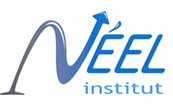- Home
- Institut Néel
- Research teams
- Technical Groups & Services
- Work at the Institut
- Partnerships
Link visio : https://meet.jit.si/HippoPhDDefense
The defence will be in English.
The fundamental nature of causality has been challenged by quantum theory. In particular, recent developments have shown that by relaxing the standard assumption that quantum events are embedded in a fixed background causal structure, a new kind of causal relations, indefinite, can emerge. These indefinite causal structures have been interpreted as causal loops allowing for the violation of a form of causality without paradoxes. On the other hand, quantum contextuality shows that any attempt to extend quantum theory such that classical logic holds in the extended domain fails due to the rise of inconsistent logical loops. There has been increasing evidence that it is a key feature in the understanding quantum paradoxes. This thesis aims at improving our understanding of indefinite causal orders and quantum paradoxes in order to address the question: “Could the non-fundamental nature of causality be related to a form of contextuality ?” The process matrix formalism is a mathematical framework which, in analogy with entanglement and the violation of Bell inequalities (nonlocality), offers new tools – witnesses of causal nonseparability and the violation of causal inequalities with noncausal correlations – to study and identify indefinite causal orders. In a bottom-up approach, we have identified a large class of physically implementable processes, the quantum circuits with quantum control of causal order (QC-QCs), that includes causally nonseparable processes such as the celebrated “quantum switch”. However these circuits cannot be used to violate causal inequalities. Nevertheless, in another work, I have proposed a significant relaxation of assumptions to certify the causal nonseparability of many processes, showing that it can be done in a semi-device-independent scenario with untrusted local operations and trusted quantum inputs. In particular, I have shown that the quantum switch can generate noncausal correlations in this kind of scenario. In order to refine my understanding of quantum contextuality, I have investigated the origins of the Kochen-Specker theorem and I have analysed how the Hardy paradox entails a form of logical contextuality. I have identified that the two possible intermediate measurements involved in a pre-post-selection version of the paradox differ causally from each other. This analysis might be useful to study of the Frauchiger-Renner paradox, a “meta-version” of the Hardy paradox. On a more metaphysical aspect, I have argued for a “Gödelian hunch” from quantum theory, the idea that quantum paradoxes emerge from a lack of distinction between theoretical and metatheoretical objects. Finally, in order to establish a link between indefinite causal orders and contextuality, I have proposed a new causal game, in which the grandfather paradox is formalized in terms of a logical inequality. Some process matrices can violate the causal inequality without violating the logical one. I suggest that the emergence of logical inconsistencies from the violation of a logical inequality might be interpreted as a form of contextuality.
Thesis Supervisor:
Cyril Branciard
Institut Néel
Jury Members:
M. Caslav Brukner
Universität Wien, Referee
M. Pablo Arrighi
Université Paris – Saclay, Referee
Mme Ana Belen Sainz
Uniwersytet Gdanski, Examiner
M. Aurélien Drezet
Institut Néel, Examiner
Me Lidia Del Rio
École Polytechnique Fédérale de Zürich, Examiner
